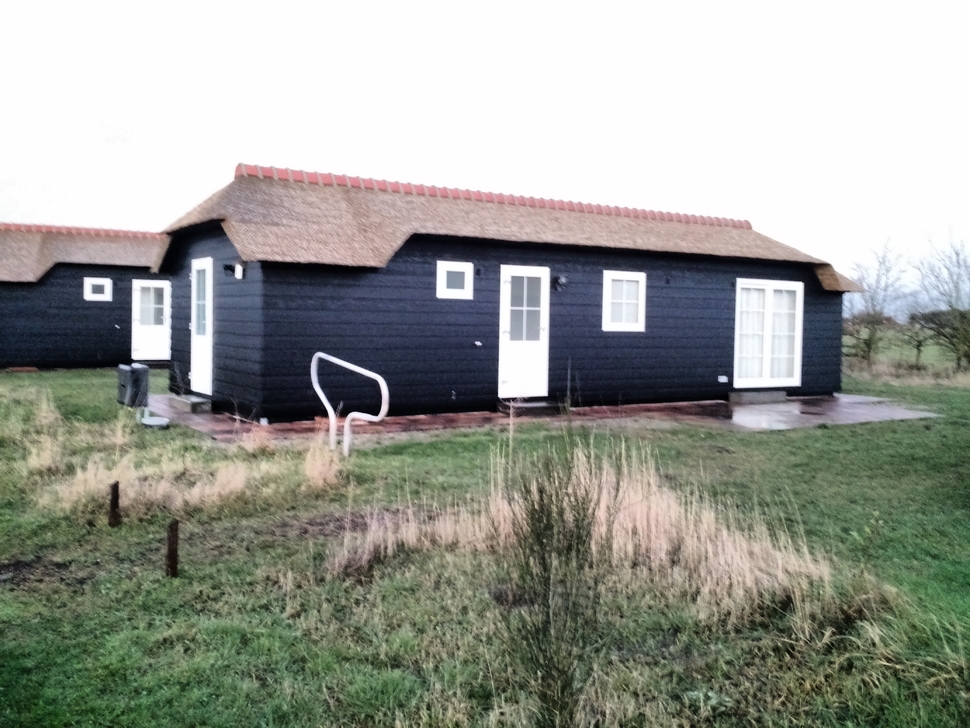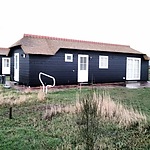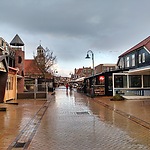Having to design a system to accommodate the community in Texel, on field research on the current situation had to take place. Before coming to Texel, along with the literature study and the online research, we contacted some locals related to the accommodation sector in order to interview them upon our arrival. What we were interested in was the characteristics of the existing buildings and facilities that should be transformed and reused for a transition towards a more sustainable system to take place. Moreover, the opinion of the owners and the occupants had to be taken into account since for a plan to succeed the willingness and the support of the local community is of a great importance.
On Tuesday, 13th of January we rode with our bicycles to the North of the Island to De Koog. De Koog is a tourist village, consisting mostly of summer houses.
Then we visited “Bremakker” camp site in Den Burg to interview its owner.
De Koog
The main tourist town of Texel is de Koog. It has a lot of bungalows, chalets and tourist recreation such as cafés, shops and restaurants. Many people have described this place as a ghost town in winter and by the looks of it, it seems partly true. We visited the place on a Tuesday afternoon. Many of the shops were closed, some for a longer period of time. Various restaurants and cafes have flexible opening hours so they can adapt to the big changes in amount of tourists.
Two shops were actually open. The first one was a real estate agent, which was the ideal place to ask questions. Some locals pointed out the absence of rental homes on the island, which makes it unattractive for starters to come here. The real estate agent was able to confirm this. He also pointed out De Koog isn’t always as empty as it appeared to us. A lot of tourists still appeared on weekends, which seemed to be enough to keep some campsites running. The second store that was open was a fashion store. The clerk here confirmed the weekends were enough reason to keep the store running. Apparently this winter situation isn’t as bad as we suspected. However, there are still a lot of empty beds on weekdays. Which means they could be used more usefully.
Campsite de Bremakker
Campsite De Bremakker won the Golden Barometer in 2010; an award for sustainable touristic companies. To achieve this, a variety of technologies had to be added. The reception is a sustainable house using grey water to flush toilets. The owners use harmless cleaning products. Waste gets separated and some chalets have smart lighting, water meters and solar panels installed.
We talked to one of the owners of this website. He told us his father started by placing coins in the showerheads to save water. This trend of sustainability kept going within de company.
Unfortunately, the campsite doesn’t compete for the award anymore. There are too many formalities and the process has become too bureaucratic and costed too much time. At the same time it seemed as if other companies received the award too easily, so the company didn’t stand out anymore. They campsite still has sustainability high in their mind, but actions that were already done became less important to propagate.
Eventually the aim of the campsite shifted more to the experience of the accommodation. Now it’s more about creating a sense of luxury and nature. The luxury houses with more isolation have a greater occupation than not insulated chalets. The sustainability isn’t a selling point, but it does get tourists enthusiastic, because it could be seen as some sort of luxury.
So, there is willingness for sustainability in the company. However, it should be profitable and/or offer something for the tourists. Sometimes it can even costs money if the idea is right, which is why the company has a deal with Aqua TX. What’s important to him is showing sustainability, so people think about it.
We also asked the owner why the campsite is closed during winter, since some of the campsites are open. He mentions it costs more personnel. Other campsites aren’t really open because they earn so much from the tourists they gain, but it’s more about keeping themselves occupied. Many chalets at the moment are empty, since tourists in winter prefer bungalows. However, there is a current trend which shows more tourists appearing during wintertime, although this could mean less people appearing in summertime. He says he enjoys his rest in wintertime, so increasing winter tourism isn’t that important to him.
So we asked him if he sees anything in other efficient uses of the chalets. Unfortunately he can’t, rent out chalets for a longer period of time, since it’s in the contract. His main income is also from the café/restaurant, and permanent users won’t use that. Using the chalets as rental homes isn’t interesting to him. For students and starters there are better alternatives.
The most interesting idea to him was the winterfestival aimed towards innovation, so he can offer sleeping places for a longer time to visitors. However, there are already enough free vacancies, so it wouldn’t help the empty ones that are usually closed.
Finally we asked him if he would see something in automated systems. He think the more efficient, the better, since saving money is good. However, personal contact is very important to the tourist.
Summary
- Many of the chalets are empty during the off-season (winter period), but these can currently not be used for other functionalities because of the lack of isolation and contractual obligation. Besides this, bungalows that are open during the winter are most of the times occupied during the weekends.
- During the summer it is peak season, which involves high commitment and long working hours. Therefore, the quiet period in the off-season is highly appreciated by local company owners.
- A sustainability ranking system only works when visitors are familiar with this ranking system, the requirements are clear, it is special to receive a high ranking and paperwork is low.
- The camping owner focusses more on surrounding nature, comfort and luxury of clients because these provide a more stable income within the seasons.
- Generally a change towards sustainability should be profitable, but the camping owner does support initiatives like AquaTX which is a local initiative that doesn’t make profit but sends out a message of doing good.
- For housing students/starters into chalets there are already a lot of alternatives that are more interesting than housing them into empty camping spots. The interesting solution might be a winter festival where students/starters can stay for a longer period of time.
- It is important to show sustainability in the open sight to make it discussable with visitors and trigger them into more of a “sustainability mind-set”. The goal is that visitors are going to implement these changes towards sustainability also at home.


